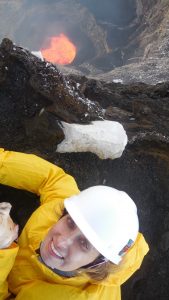August 24, 2017
Q&A with Dr. Rosaly Lopes, Senior Research Scientist at NASA Jet Propulsion Laboratory
Posted by Timia Crisp
Women’s Equality Day is August 26th! To celebrate, AGU will be highlighting several prominent women working in Earth and space science. We’ll be posting Q&A’s on The Bridge and to our various social media platforms including Twitter and Instagram!
Today’s featured scientist is Dr. Rosaly Lopes. Dr. Lopes is a Senior Research Scientist and Manager for Planetary Science at NASA JPL. She received her B.Sc. in Astronomy and her Ph.D. in Planetary Science from University College (University of London, UK).
Who or what has inspired you to pursue your research?
I grew up during Apollo days and I wanted to become an astronaut. However, I was Brazilian, female, and had bad eyesight. I de cided I would become a scientist and help the space program any way I could.
cided I would become a scientist and help the space program any way I could.
What is an obstacle you have had to overcome to get to your current position? It can be hard to balance career and personal life, including family. It can also be hard to balance research and administrative tasks. What helped me was to establish my own priorities, based on what works for me, not what other people might think they should be.
Did you have any important mentors in your career, and how did they impact you?
Yes, several. They were extremely important. I still seek mentors, as I know I can always learn from more experienced people. It is worth noting that most of my mentors have been male. A good mentor helps you to realize your potential.
What should be the future priorities for scientific research in the U.S.?
I can only comment about my own field, planetary science. It is important to have a balanced program in terms of funding and resources for flight projects, the human program, and scientific research.
How can the U.S. ensure that it continues to play a leading role in scientific discovery?
It requires an excellent educational system and appropriate funding for research. We first have to prepare our young people, and then provide the means for scientists to do research.
What discovery do you hope is made in your lifetime?
Finding life outside Earth.
Thank you to Dr. Lopes for her time and answers! Be sure to follow her on Twitter @rosaly_lopes.


